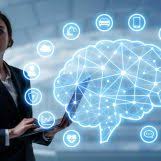Source: analyticsinsight.net
In the past decade, artificial intelligence (AI) has made it to mainstream society from academic journals. The technology has achieved numerous milestones when it comes to digital transformation across society including businesses, education, and healthcare as well. Today people can do the tasks which were not even possible ten years back.
The proportion of organizations using AI in some form rose from 10 percent in 2016 to 37 percent in 2019 and that figure is extremely likely to rise further in the coming year, according to Gartner’s 2019 CIO Agenda survey.
While the breakthroughs in surpassing human ability at human pursuits, such as chess, make headlines, AI has been a standard part of the industrial repertoire since at least the 1980s. Then production-rule or “expert” systems became a standard technology for checking circuit boards and detecting credit card fraud. Similarly, machine-learning (ML) strategies like genetic algorithms have long been used for intractable computational problems, such as scheduling, and neural networks not only to model and understand human learning but also for basic industrial control and monitoring.
Moreover, AI is also the core of some of the most successful companies in history in terms of market capitalization—Apple, Alphabet, Microsoft, and Amazon. Along with information and communication technology (ICT) more generally, the technology has revolutionized the ease with which people from all over the world can access knowledge, credit, and other benefits of a contemporary global society. Such access has helped lead to a massive reduction of global inequality and extreme poverty, for example by allowing farmers to know fair prices, the best crops, and giving them access to accurate weather predictions.
Future Impact of AI on Businesses
Following the trends, we can say that there will be big winners and losers as collaborative technologies, robots and artificial intelligence transform the nature of work. Moreover, data expertise will become exponentially more important. Across various organizations, the role of a senior manager in a deeply data-driven world is about to shift, thanks to the AI revolution. It is estimated that information hoarders will slow the pace of their organizations and forsake the power of artificial intelligence while competitors exploit it.
In the future, judgments about consumers and potential consumers will be made instantaneously and many organizations will put cybersecurity on par with other intelligence and defense priorities. Besides, open-source information and artificial intelligence collection will provide opportunities for global technological parity and soon predictive analytics and artificial intelligence could play an even more fundamental role in content creation.
Future Impact of AI of Society
With the growth of AI-enabled technologies in the future, societies will face challenges in realizing technologies that benefit humanity instead of destroying and intruding on the human rights of privacy and freedom of access to information. Also, the surging capabilities of robots and artificial intelligence will see a range of current jobs supplanted, where professional roles such as doctors, lawyers, and accountants could be replaced by artificial intelligence by the year 2025.
Moreover, low-skill workers will reallocate to tasks that are non-susceptible to computerization. All the risks will arise out of human activity from certain technological development in this technology, synthetic biology, nano techno, and artificial intelligence.


